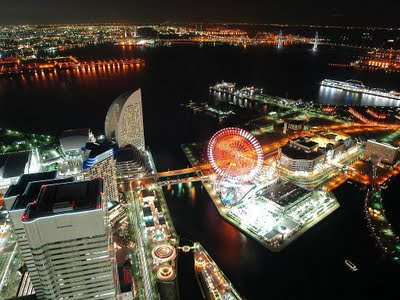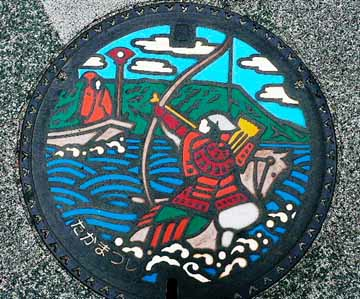Japan vs. America
It seems more and more Americans are taking a sour view of the way things are going for the country — and rightly so. “By all accounts,” our editor Kevin MacDonald writes, “particularist anger is welling up in White Americans — especially among the middle and working class — outraged at the changes they see.”
Curmudgeon James Howard Kunstler has been repeating his mantra about an America in decline: “The failure of leadership extends through government to the news media to business to the universities to the courts. All authorities are suspect. All are dishonest and cowardly.”
How can one deny that the “nation” is not in free fall? It really strikes me that it’s only a matter of time before one of the critical pillars of collective life collapses and brings the whole rotten structure down around us. I mean, isn’t it obvious that the promised multicultural utopia has degenerated into a dystopian nightmare formed from what used to be our country?
Pat Buchanan’s been making the same point as well. “In communist countries in the Cold War, all understood that the government did not represent the people. The state was at war with the nation. That idea is taking root in America — the idea that our government no longer seeks to represent us.”
That’s probably putting it mildly. Paul Craig Roberts writes more ominously about America’s likely future: “The Roman Empire lasted for centuries. The American one collapsed overnight. Rome’s corruption became the strength of her enemies, and the Western Empire was overrun. America’s collapse occurred when government ceased to represent the people and became the instrument of a private oligarchy. Decisions were made in behalf of short-term profits for the few at the expense of unmanageable liabilities for the many. Overwhelmed by liabilities, the government collapsed.”
Robertson adds, “On July 12, Niall Ferguson, an historian of empire, warned that the American empire could collapse suddenly from weakness brought on by its massive debts and that such a collapse could be closer than we think.”
Today’s column, though, is not about the state of America. It is, rather, about a leading competitor, one that has gotten right so many of the things America has gotten wrong for half a century. That country is Japan.
Over three years ago, Jared Taylor published a cover story in his American Renaissance magazine called “In Praise of Homogeneity: The Japanese know how to run a country.” It began:
I have just returned from several weeks in Japan, and am again struck by the forceful example that country offers of the advantages of homogeneity. As the years go by, Japan’s steady record of successes stands in ever-greater contrast to America’s failures, and to its inability to think seriously about the kind of country it is becoming…. [T]he Japanese have a much better chance than we do of surviving into the next century as a coherent, prosperous nation with a culture and civilization it can unmistakably call its own.
Taylor liberally used photographs to show how clean and prosperous Japan had become. For instance, even manhole covers were artistically designed. Of course he mentions the enviable conventional wisdom about Japan, that “there is essentially no place at no time that is or feels unsafe.”
As an opponent of the open borders, non-White immigration that has prevailed in America for decades, Taylor makes the contrast with Japan’s. “We are told over and over that immigration is an inevitable consequence of world travel, of a shrinking globe, and that without big doses of foreigners a country cannot be truly international or participate in the global economy. Again, Japan proves this is nonsense.”
To drive home his point, he imagines what a fresh-eyed American tourist would see. “Still, what probably first strikes a visitor from America is the sense that Japan is simply more advanced than the US. There are many things that contribute to this impression, but some of the most important are that everything seems to work, everything is clean, everything is orderly, everything spruce and tidy.”
Having been the beneficiaries of a rising currency for decades, millions of Japanese have been able to travel, work and study abroad. Thus, they have gained the ability to begin assessing their own country’s status in the world. As Taylor wrote, “Many Japanese realize that, in many respects, they have a better country than we do. They envy us our continent-sized country and our raw materials, but they no longer see us as a model for much of anything.”
Mr. Taylor, who grew up in Japan until he was sixteen, knows what he’s talking about when it comes to Japan. Fluent in Japanese (and French), he continues to work on projects related to Japan. Back in the mid-1980s, when Japan was just heading toward the center of the American business radar scope, he published a book called Shadows of the Rising Sun: A Critical View of the Japanese Miracle. A man with such a perspective is a good source, especially since he is fully a race realist.
Having read his AMREN story, I was therefore even more impressed last year when I viewed an Internet page that pointed out the irony that America, the country that won the war in the Pacific, was now far below its adversary, Japan. To make the point, it contrasted Hiroshima and Nagasaki with Detroit 64 years after the war’s end:
We all know that Hiroshima and Nagasaki were destroyed in August 1945 after explosion of atomic bombs. However we know little about the progress made by the people of that land during the past 64 years.
DETROIT — 64 YEARS AFTER HIROSHIMA: Welcome to Detroit …next 2 Exits – Drugs- Ammo
The wave of Japan-o-philia began with Harvard professor Ezra Vogel’s bestseller Japan as Number One. In support of the book, influential postwar ambassador to Japan, Edwin Reischauer, wrote that, “Japan today has a more smoothly functioning society and an economy that is running rings around ours.”
An odd thing happened after that, however. With all the praise heaped on Japan for its “economic miracle” of the time, it was inevitable that contrarians would emerge to challenge that view.
For instance, trade negotiator Clyde Prestowitz’s Trading Places: How We Are Giving Our Future to Japan and How to Reclaim It. There was also The Enigma of Japanese Power by Dutchman Karel Van Wolferen. Unlike Vogel, the authors here argued that yes, Japan was economically successful, but it was a threat to America.
This argument was surprisingly advanced by a writer for The Atlantic Monthly, James Fallows. Originally, he was the chief speechwriter for liberal Democrat President Jimmy Carter, but he became critical of Japan upon being posted there by The Atlantic in the late 1980s. To this day, it remains rare for a White American liberal to be so hard on a nation of non-Whites. This was particularly true of his highly readable essay “Containing Japan.”
Japan’s prosperity continued, causing many observers to claim it was more a bubble than real wealth. Sure enough, from 1991–93 Japan experienced a humiliating bursting of its “bubble economy and beginning of its “lost decade.”
But was the Japanese downfall real? A friend of mine living in Japan claimed things were just fine — Japan’s economy was humming along like before and that its factories were constantly moving up the economic food chain. “Look, I’m living in Japan. They used to live in rabbit hutches but now have soaring concrete condominiums and park their luxury European cars in basement garages.” In the mid-‘90s he sent us Blindside: Why Japan is Still on Track to Overtake the U.S. by the Year 2000. Written by feisty Irishman Eamonn Fingleton, it actually amused me because I liked his over-the-top prose.
By the late 1990s, my friend had bought a house near Osaka, Japan’s number two city and actually seemed to prefer life in Japan to that in America. Increasingly, he hated the coarse pop culture in America, especially rap and hip hop. And whenever he’d come through L.A. or New York, he’d be appalled at the cities of Babel they had become, what with Jamaican cab drivers and Iranian shoe store managers and the proliferating numbers of convenience stores run by Indians (the ones from India). This was not, he continually harped, the America he had grown up in.
His life in Japan was now better in most ways than it was for family members back home. In his view, the big difference between Japan and the US was that the Japanese government was structured to work toward the greater good of Japan and its people, even at this late stage of capitalism. This was true throughout most of Asia. Japan was still conscious of nationality (race really, since 98% of residents in Japan are pure Japanese). Because of government policy, businessmen could not line their own pockets short term at the expense of the long term good of the country.
America — but really most of the Anglosphere — was different. Everything was geared toward immediate profits and big bonuses for offshoring manufacturing rather than for long term viability — individualism run rampant. This lack of concern for national interest extends even to critical areas of our foreign policy — designed by people with a passionate attachment to a foreign country.
As for the argument that with its aging population and plummeting birthrate, Japan has no choice but to allow massive immigration, the Japanese disagree. You see, the “must have immigration” argument applies only to White nations. Japan, China, Korea, and Taiwan are having none of it, yet they are prospering. This came up in responses to a Steve Sailor VDARE column by a reader from Japan:
I commend Steve Sailer for yet another on-target laser beam concerning America’s death-by-immigration and the bipartisan roots of this self-made disaster.
An irreversible disaster too, for this is the one lunacy that can never be expiated—except through untold misery, nation breakup, violence, and not infrequently, civil war.
One of Sailer’s most important contributions is to highlight the prominent role that American Jews have had in this dissolution.
It’s a brave thing for Steve to do, for it exposes him not merely to a barrage of “nativism” and “racism” projectiles but also to the concussions of “anti-Semitic hate” grenades lobbed from the well-fortified trenches of the Treason Lobby (links in original).
The letter writer, using the pen name Takuan Seiyo, admits that Jews played a prominent role not only in our disastrous immigration policy but also in our disastrous civil rights legislation and “the dysfunctional minoritarian tyranny that has resulted from it.” Funny then that he would attack Kevin MacDonald as an anti-Semite when they’re making similar arguments. (MacDonald responded here.)
I was reminded of all this when I read an article recently by new TOO writer Christian Miller. This time he was writing on Greg Johnson’s Counter-Currents site and he used the case of Japan to argue that only White countries were being targeted by genocide through immigration:
Japan is one of the most highly advanced economies in the world. It is a well-known and well-documented fact that Japan faces a grave population decline. There are not enough young Japanese to assume the lower rungs of the workforce. The elderly Japanese population looms on the horizon, destined to strain the retirement and pension system. The Japanese reproductive rate is far below the replacement rate. Over time, Japan’s population will continue its precipitous descent. Under the orthodox globalist economic doctrine, Japan’s situation beckons for a massive influx of cheap foreign labor. Yet somehow the international political discourse barely broaches the topic of massive non-Japanese immigration to Japan. There is no strong international or domestic pressure (or imperious demand) for Japan to import millions of Africans or South Americans. Japan is not singled out for genocide via massive non-Japanese immigration. Japan is not the target. Japan is free to remain Japanese. It is only White nations that are targeted for White genocide.
That’s a good point. Let’s face it, immigration is not inevitable, especially in the case of America. We had plenty of Whites (nearly 90%, as Miller writes), so what we really needed was a pro-natal policy rather than an “invade the world, invite the (non-white) world” policy.
But we are ruled by a hostile elite that knows exactly what it wants to do to us. Will we ever truly resist?












Comments are closed.